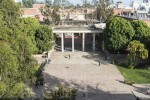A UCLA researcher was awarded $1.4 million to further develop a stem cell-based cancer treatment.
Lili Yang, a researcher from the Eli and Edythe Broad Center of Regenerative Medicine and Stem Cell Research at UCLA, received the grant Thursday from the California Institute of Regenerative Medicine’s Quest Awards Program to develop her method of genetically modifying blood-forming stem cells to help treat cancer. Yang is also an assistant professor of microbiology, immunology and molecular genetics.
In the body, stem cells become T-cells, a part of the immune system that targets various types of cancer. Other researchers have not been able to utilize these cells for cancer treatments because there are not enough of these cells in the body.
Yang’s new method genetically modifies stem cells from healthy donors and places them in an artificial thymic organoid. The organoid replicates the functions of the thymus and helps convert blood-forming stem cells into immune cells. The stem cells will produce invariant natural killer T cells, which can be multiplied and then frozen for use in treatments for future cancer patients.
Yang expects to produce 1,000 to 10,000 doses of such T-cells from a single blood stem cell donor. The treatment could be used to treat solid tumors, like melanoma, or blood cancers, like leukemia.
The lab plans to test the treatment on animals before testing the effectiveness on humans in clinical trials.
